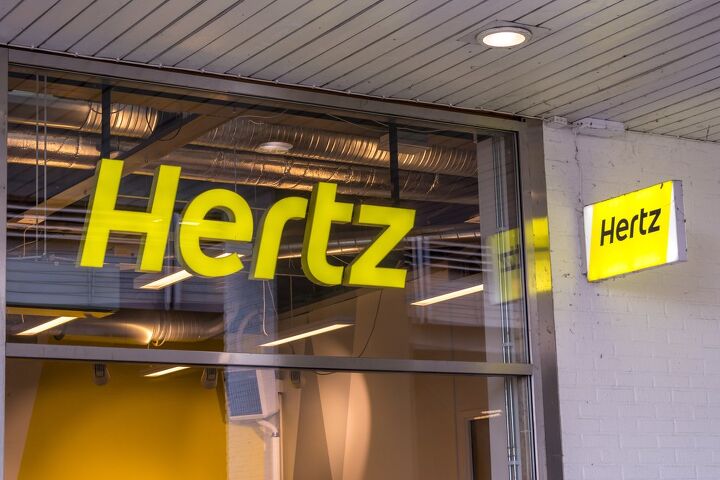Hertz Hits a Wall With Creditors

Hertz Global Holdings Inc. has been in discussions with creditors in the hopes of making a deal that addresses its missed debt payments and gives the company further leeway. Rental agencies are struggling, with Hertz in the roughest shape of all. All thanks to a certain virus, business has dried up, and Hertz finds itself sitting on a pile of quickly depreciating cars it cannot afford to replace. The company’s stock also plummeted at the end of February — going from $20.29 per share to today’s $2.86.
The rental agency has until Friday to negotiate an extended forbearance agreement or drop $400 million in lease payments, but news has surfaced that lenders think Hertz declaring bankruptcy may be just as good a solution.
According to Automotive News, inside sources claim the rental agency has reached an impasse with creditors. While business will probably rebound eventually, it’s looking as though Hertz will need to be kept on life support until contagion fears subside for that to happen. This offers little assurance to those interested in a prompt payday. Forcing the outfit to sell off its assets (a fleet of over 750,000 relatively new automobiles) now seems the probable outcome.
From Automotive News:
An uptick in used-vehicle prices from dismal levels seen in March and April have given [asset-backed securities] holders less incentive to extend the forbearance period for Hertz a second time, the people said. Back in April, lenders were more willing to be lenient to avoid selling the vehicles backing the ABS into a deeply depressed market.
Prices of used vehicles hit bottom the week ending April 19, down more than 15 percent from where they were prior to government shutdown orders, according to market researcher J.D. Power. But by the end of the first week of May, prices were down less than 10 percent.
Still, any liquidation scenario does pose a risk to bondholders. Selling off cars quickly can help maximize the value of assets that rapidly depreciate, but flooding the market with too many cars depresses prices.
[Image: vieninsweden/Shutterstock]

A staunch consumer advocate tracking industry trends and regulation. Before joining TTAC, Matt spent a decade working for marketing and research firms based in NYC. Clients included several of the world’s largest automakers, global tire brands, and aftermarket part suppliers. Dissatisfied with the corporate world and resentful of having to wear suits everyday, he pivoted to writing about cars. Since then, that man has become an ardent supporter of the right-to-repair movement, been interviewed on the auto industry by national radio broadcasts, driven more rental cars than anyone ever should, participated in amateur rallying events, and received the requisite minimum training as sanctioned by the SCCA. Handy with a wrench, Matt grew up surrounded by Detroit auto workers and managed to get a pizza delivery job before he was legally eligible. He later found himself driving box trucks through Manhattan, guaranteeing future sympathy for actual truckers. He continues to conduct research pertaining to the automotive sector as an independent contractor and has since moved back to his native Michigan, closer to where the cars are born. A contrarian, Matt claims to prefer understeer — stating that front and all-wheel drive vehicles cater best to his driving style.
More by Matt Posky
Latest Car Reviews
Read moreLatest Product Reviews
Read moreRecent Comments
- JLGOLDEN Enormous competition is working against any brand in the fight for "luxury" validation. It gets murky for Cadillac's image when Chevy, Buick, and GMC models keep moving up the luxury features (and price) scale. I think Cadillac needs more consistency with square, crisp designs...even at the expense of aerodynamics and optimized efficiency. Reintroduce names such as DeVille, Seville, El Dorado if you want to create a stir.
- ClipTheApex I don't understand all of the negativity from folks on this forum regarding Europeans. Having visited the EU multiple times across different countries, I find they are very much like us in North America-- not as different as politicians like to present them. They all aren't liberal "weenies." They are very much like you and me. Unless you've travelled there and engaged with them, it's easy to digest and repeat what we hear. I wish more Americans would travel abroad. When they return, they will have a different view of America. We are not as perfect or special as we like to believe. And no, many Europeans don't look up to America. Quite the opposite, actually.
- Dwford Let's face it, Cadillac is planning minimal investment in the current ICE products. Their plan is to muddle through until the transition to full EV is complete. The best you are going to get is one more generation of ICE vehicles built on the existing platforms. What should Cadillac do going forward? No more vehicles under $50k. No more compact vehicles. Rely on Buick for that. Many people here mention Genesis. Genesis doesn't sell a small sedan, and they don't sell a small crossover. They sell midsize and above. So should Cadillac.
- EBFlex Sorry BP. They aren’t any gaps
- Bd2 To sum up my comments and follow-up comments here backed by some data, perhaps Cadillac should look to the Genesis formula in order to secure a more competitive position in the market. Indeed, by using bespoke Rwd chassis, powertrains and interiors Genesis is selling neck and neck with Lexus while ATPs are 15 to 35% higher depending on the segment you are looking at. While Lexus can't sell Rwd sedans, Genesis is outpacing them 2.2 to 1.Genesis is an industry world changing success story, frankly Cadillac would be insane to not replicate it for themselves.


































Comments
Join the conversation
@Theloon is back at it again. The freedum fighter. Sunetra Gupta was basing his assumptions upon the idea that at least 50% of the population has been exposed to SARS-CoV-2. Sweden had assumed that at least 30% of their population has been exposed. Seroprevalence studies in Sweden show only 7.3% of the populace has been exposed. This link explains why Sweden's approach won't work in the USA. https://www.healthline.com/health-news/heres-what-happened-in-sweden-and-you-cant-compare-it-to-u-s#Sweden-not-untouched-by-COVID-19 "In Sweden, 13 percent of adults have obesity and 6.9 percent have diabetes, while 40 percent of American adults have obesity and 9.1 percent have diabetes." "Swedes have government-funded universal healthcare. Contrast this with the 29 percent of American adults who are underinsured and 13 percent who are uninsured. Many of these people have untreated chronic health conditions that put them at greater risk from COVID-19." "The Swedish government even provides paid sick leave" "As a result, many Swedes voluntarily follow the COVID-19 guidelines put forth by their government." "Björn Olsen, a professor of infectious medicine at Uppsala University (Sweden), said herd immunity was a “dangerous and unrealistic” approach. “I think herd immunity is a long way off, if we ever reach it,” "It’s now settled fact, based on reams of data from nearly every Western country, that lockdowns do not work. " Trumpoid Dipsh!t Syndrome British Columbia has one of the the lowest COVID-19 death rates in North America. https://www.bloomberg.com/news/articles/2020-05-16/a-virus-epicenter-that-wasn-t-how-one-region-stemmed-the-deaths
When two people from your office building die from COVID-19, you take COVID-19 seriously. One was an avid runner, getting in at least one 10K a month. Those who post because they can't go to Golden Corral and "muh four pieces of pie" get taken far less seriously.